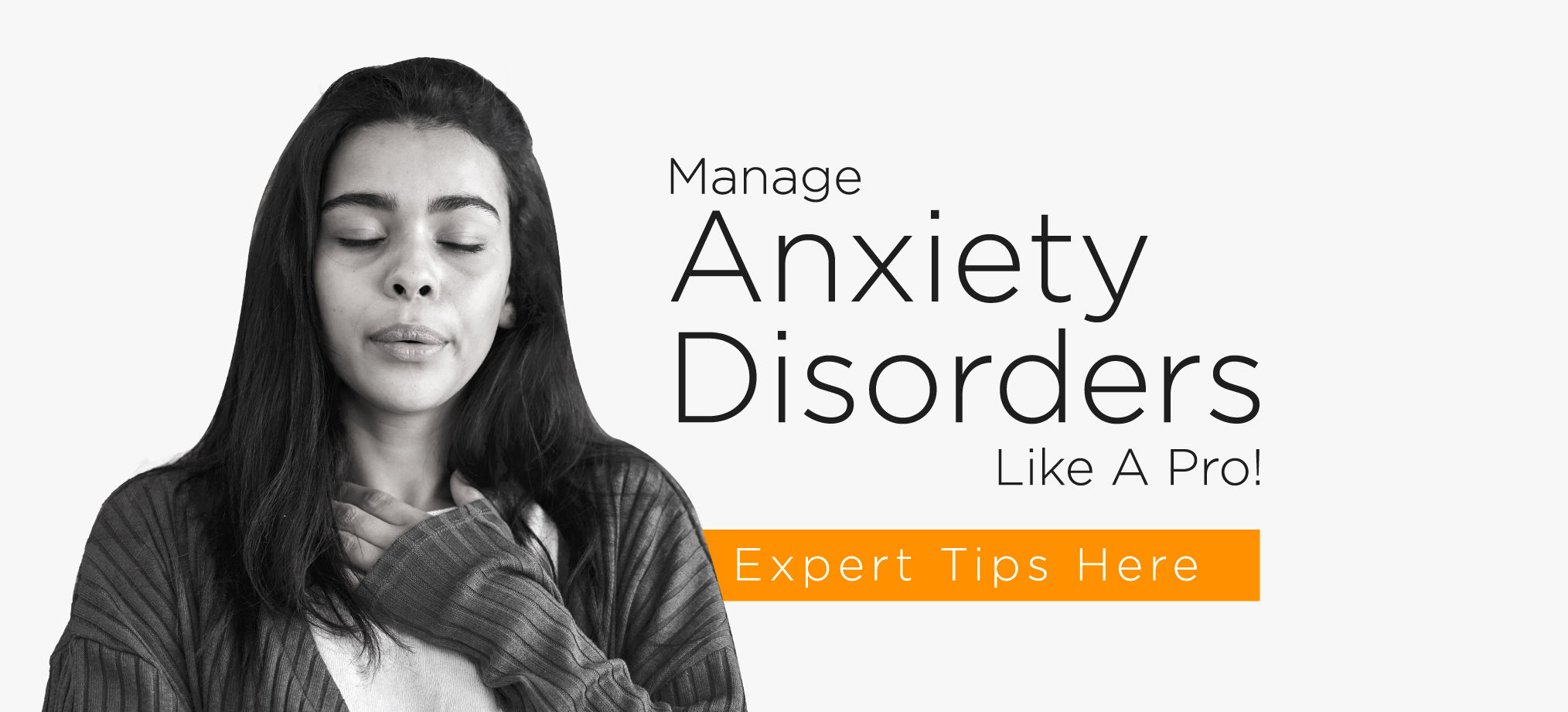Mental Health
Learn How To Manage Anxiety Disorders
3 min read
By Apollo 24|7, Published on - 28 March 2023, Updated on - 21 June 2023
Share this article
0
0 like

Anxiety is a common and natural response to stress or danger. However, in most cases, if left undiagnosed, anxiety can start interfering with daily life and causing significant distress. Anxiety disorders are a group of mental health conditions that are characterised by persistent and excessive anxiety or fear. In this blog post, we will explore the different types of anxiety disorders and provide tips for managing them.
1. Generalised Anxiety Disorder (GAD)
If your anxiety becomes excessive and persistent, making it challenging to manage and affecting your daily activities, it could be a sign of generalised anxiety disorder. This disorder can be a persistent struggle, often comorbid with other anxiety or mood disorders. Fortunately, many people with this condition find relief through psychotherapy, medication, lifestyle changes, coping strategies and relaxation techniques.
2. Panic Attacks
A panic attack is a sudden occurrence of intense fear accompanied by severe physical symptoms without any actual threat or apparent cause. Panic attacks can be a terrifying experience, leading to a heart attack or even death. If an individual experience recurrent, unanticipated panic attacks and spends prolonged periods in constant fear of another attack, they may have a condition called panic disorder. Nevertheless, effective treatments such as anti-anxiety medications and psychotherapy are available to manage the symptoms of this severe disorder.
3. Social Anxiety Disorder
Individuals with social anxiety disorder, also known as social phobia, experience significant anxiety, self-consciousness, and embarrassment in their everyday interactions due to the fear of negative scrutiny or judgment from others. Fear and anxiety associated with social anxiety disorder can lead to avoidance of certain situations that can disrupt daily life.
However, with the help of psychotherapy to learn coping mechanisms and medication, individuals with social anxiety disorder can gain confidence and improve their ability to interact with others.
4. Specific Phobias
Specific phobias refer to an excessive and irrational fear of objects or situations that pose little danger, leading to avoidance and anxiety. Unlike the brief anxiety that one might experience when giving a speech or taking a test, specific phobias persist for a prolonged period and result in intense physical and psychological reactions.
If the phobia disrupts daily life, numerous therapeutic interventions are available to help individuals work through and overcome their fears, often with lasting results.
5. Obsessive-Compulsive Disorder (OCD)
Obsessive-compulsive disorder (OCD) is a mental health condition characterised by recurrent and unwanted thoughts or sensations (obsessions) and repetitive behaviours or mental acts (compulsions). An obsessive thought in OCD may revolve around specific numbers or colours being either "good" or "bad." At the same time, compulsive behaviour may entail repetitive behaviour such as washing one's hands repeatedly after touching something that might be unclean.
OCD has no cure but a combination of cognitive-behavioural therapy, medication, relaxation and neuromodulation can help manage symptoms.
6. Post-Traumatic Stress Disorder (PTSD)
PTSD is a mental illness that can develop after a person experiences or witnesses a traumatic event. Examples of traumatic events include natural disasters, accidents, acts of terrorism, war, sexual assault, historical trauma, intimate partner violence, bullying, and so on. While not everyone who experiences trauma develops PTSD, some people require professional treatment to recover from the intense psychological distress it causes.
7. Separation Anxiety Disorder
Separation anxiety is a typical phase of child development, which fades away around age 2. However, separation anxiety disorder (SAD) affects 3-4% of children and may continue into their school and teenage years. To prevent this in children, seek professional advice as soon as possible.
Anxiety disorders can significantly impact daily life, but effective treatments are available. If you or any of your acquaintances are experiencing symptoms of an anxiety disorder, it is important to seek the help of doctors.
Consult Apollo's Expert Psychologists
Medically reviewed by Dr Sonia Bhatt.
Mental Health
Leave Comment
Recommended for you

Mental Health
Food and Mood: More Connected than You Think
Our brain requires several dietary nutrients to function properly. This article addresses how diet and eating habits can affect mental health.

Mental Health
Can Diet Improve Depression Symptoms?
What you eat has a significant effect on your physical health as well as your mental well-being. Many studies have shown a strong link between diet and the risk of developing depression. Read to know more.

Mental Health
Stressed Out In Every Situation? Here's How To Cope With The Anxiety
Anxiety Disorder is widespread among young adults today, but it can be treated with the right mix of therapy, medication, lifestyle, and support from loved ones. Do you suffer from situational anxiety? Read below the symptoms and how to cope with them to overcome anxiety.
Subscribe
Sign up for our free Health Library Daily Newsletter
Get doctor-approved health tips, news, and more.
Visual Stories

Overcome Insomnia with a Healthy Lifestyle
Tap to continue exploring
Recommended for you

Mental Health
Food and Mood: More Connected than You Think
Our brain requires several dietary nutrients to function properly. This article addresses how diet and eating habits can affect mental health.

Mental Health
Can Diet Improve Depression Symptoms?
What you eat has a significant effect on your physical health as well as your mental well-being. Many studies have shown a strong link between diet and the risk of developing depression. Read to know more.

Mental Health
Stressed Out In Every Situation? Here's How To Cope With The Anxiety
Anxiety Disorder is widespread among young adults today, but it can be treated with the right mix of therapy, medication, lifestyle, and support from loved ones. Do you suffer from situational anxiety? Read below the symptoms and how to cope with them to overcome anxiety.
